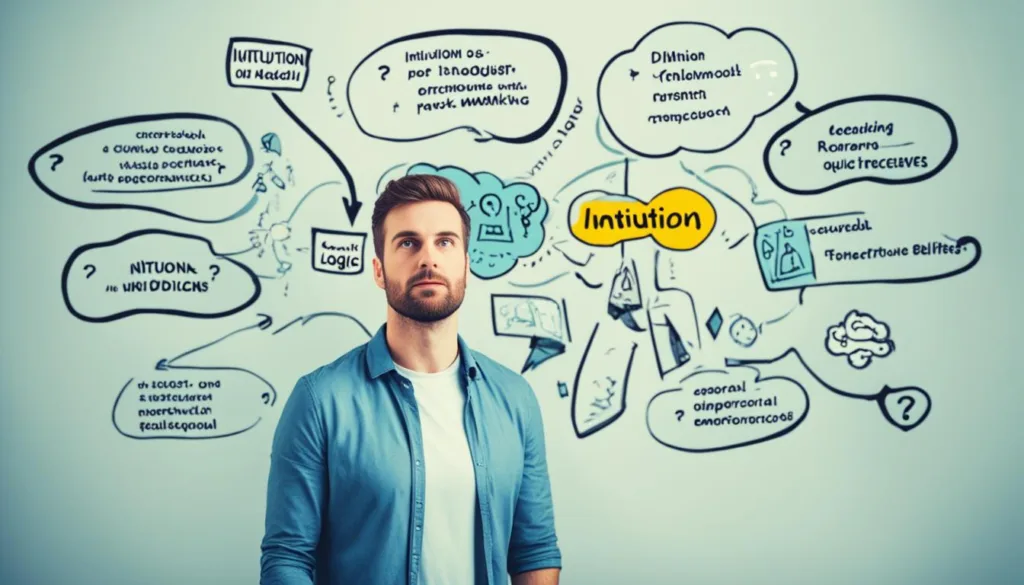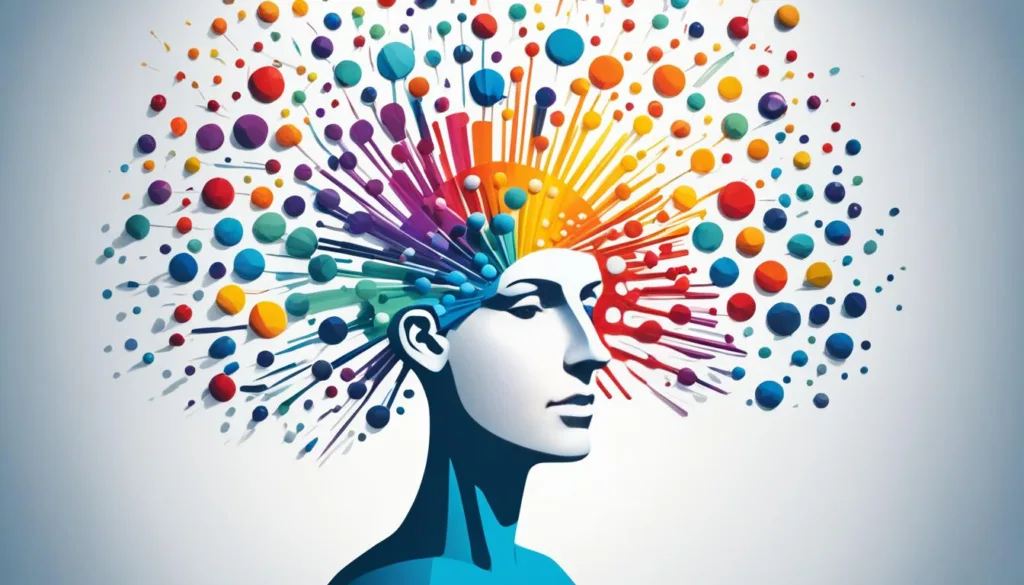Have you ever paused mid-conversation, suddenly aware that your thoughts have wandered off in a completely different direction? Or perhaps you’ve found yourself reaching for a comforting snack without really deciding to? These moments reveal the powerful yet often invisible forces of your cognitive processes at work, orchestrating your behavioral change and steering the ship of decision-making, even when it feels like you’re not at the helm.
Whether you’re navigating the complexities of mental frameworks in professional settings or wrestling with psychological patterns in personal relationships, it’s the intricate dance between your brain and behavior that defines the outcome. Cognitive psychology has delved deep into these thought processes, illuminating the pathways of influence and providing keys to behavior modification. And it turns out, the very essence of who we are is profoundly shaped by these unseen cognitive currents.
Let’s unpack this mystery together and explore how, beneath the surface of our conscious minds, a remarkable symphony of cognition directs the grand performance we call life.
Key Takeaways
- Identifying how cognitive processes covertly influence your everyday behavior and choices.
- Recognizing the role of psychological patterns and mental frameworks in effective decision-making.
- Understanding the relationship between cognitive psychology, brain function, and behavior modification.
- Exploring how repeated behaviors can develop into habits through cognitive and neurological reinforcement.
- Uncovering the potential for transforming our lives by modifying the underlying cognitive structures that drive behavior.
Unraveling the Intricacies of Cognitive Processes
Welcome to a fascinating journey through the intricate network of your mind, where every thought and action stems from the cognitive ballet of brain and behavior. In this exploration of cognitive psychology, you’ll discover how neurons, neurotransmitters, and neurological functions collectively orchestrate your daily experiences.
The Brain’s Command Center: Understanding Neurological Basis of Behavior
The human brain is an engineering marvel that sustains your very essence. Within its folds, billions of neurons connect to form elaborate circuits, much like a city’s intricate infrastructure, continuously directing the bustling traffic of sensory information and responses that define your interactions with the world.
The Role of Neurotransmitters in Decision-Making
Imagine neurotransmitters as the diplomatic envoys of your brain, carrying vital messages between neural pathways. These chemical messengers are at the heart of how you make decisions, from the simple choices like selecting what to wear, to complex moral dilemmas. The delicate balance of neurotransmitters is crucial for the harmony of mind and behavior.
How Drugs Affect Cognitive Functions
Drugs exert their influence by hijacking the normal communication in the brain, sometimes mimicking neurotransmitters or causing their excessive release. This interference can lead to significant changes in cognition, potentially rewiring the brain’s reward system and impacting neurological functions. Let’s delve deeper into the specific ways drugs can reshape thinking and behavior:
| Drug Type | Effect on Neurotransmitters | Impact on Cognitive Functions |
|---|---|---|
| Stimulants (e.g., amphetamines) | Increases dopamine and norepinephrine | Heightens alertness, but can lead to overstimulation |
| Opioids (e.g., heroin) | Mimics endorphins, inhibits GABA | Induces euphoria, impairs judgment and decision-making |
| Depressants (e.g., alcohol) | Enhances GABA, suppresses glutamate | Slows brain activity, affects memory and cognitive processing |
| Psychedelics (e.g., LSD) | Similar structure to serotonin, affects its receptors | Alters perception, can cause profound shifts in thought patterns |
By understanding the ties between cognitive psychology and drug effects on cognition, you empower yourself with the knowledge to foresee and perhaps mitigate the impact substances may have on your neurological functions and overall well-being.
The Interplay of Cognition and Behavior in Everyday Life
You might not be aware of it, but your daily actions and decisions are significantly influenced by behavioral change, decision-making, mental frameworks, and thought processes. Cognitive psychology sheds light on this fascinating dance between your mind’s inner workings and how you behave in the real world.
Whether you’re choosing what to eat for breakfast or deciding the best route to work, your cognitive functions are hard at work. They sift through your past experiences, analyze your current situation, and influence your actions— all in a split second. This sophisticated interaction is why understanding cognitive psychology is essential for fostering positive behavioral changes.
“The mind is like a parachute. It doesn’t work if it isn’t open.” – Frank Zappa.
This famous quote encapsulates the essence of openness in thought processes, a vital aspect of adaptive decision-making. Let’s delve deeper into the practical applications of our cognitive understanding.

| Cognitive Aspect | Role in Decision-Making | Application |
|---|---|---|
| Memory | Serves as the foundation for learning from past experiences to inform present choices. | Enhanced memory strategies help in education and coping with memory disorders. |
| Attention | Filters out distractions to focus on relevant information for better choices. | Developing strategies for sustaining attention in ADHD treatment and enhancing productivity in work environments. |
| Language | Facilitates communication of thoughts and intentions, influencing collaborative decisions. | Language acquisition studies are pivotal in designing more efficient language learning curricula. |
| Learning | Adapts behavior based on new information and experiences, essential for personal growth. | Applying learning theories to create personalized educational methodologies that cater to diverse learning styles. |
As you navigate your day, remember that each choice you make is an outcome of intricate cognitive activities. With this knowledge, you can refine your mental frameworks to align with the behavioral changes you aspire to achieve, optimizing your decision-making process for a more fulfilling life.
Cognition and Behavior: The Underlying Science of Everyday Decisions

Have you ever considered how your brain seamlessly tunes out the cacophony of a bustling coffee shop, allowing you to focus on the work at hand, or the myriad cognitive processes involved when you pick up a new language and use it to navigate a foreign city? Behind these seemingly automatic behaviors is a complex interplay of cognitive processes that influence every decision you make. Understanding these processes offers powerful insights into everyday decision-making.
Attention and Information Processing: Tuning Out Distractions
In a world bustling with stimuli, your ability to concentrate on specific information is crucial. Cognitive processes involving attention and information processing form the bedrock of efficient decision-making. Through the selective attention mechanism, the brain filters and processes relevant information while sidelining irrelevant noise.
Language and Memory’s Impact on Behavioral Outcomes
Language is a cornerstone of human interaction and cognition, playing a seminal role in shaping thoughts and decisions. Coupled with memory, language determines how you process experiences and retrieve information for future use. Language acquisition isn’t just about adding words to your lexicon; it expands your cognitive framework, influencing how you perceive and interact with the world.
Problem-Solving: The Cognitive Cornerstone of Human Behavior
Problem-solving is an essential cognitive process that engages several brain regions to find solutions to new challenges. Whether strategizing for a project, resolving conflicts, or simply deciding what to eat for dinner, your problem-solving abilities are in constant play, demonstrating the significant role of this cognitive function in the myriad decisions you make daily.
| Cognitive Process | Role in Decision-Making | Applications in Daily Life |
|---|---|---|
| Attention | Focuses the brain’s resources on pertinent tasks | Enhancing productivity during work |
| Information Processing | Filters out irrelevant details and processes important data | Understanding complex information |
| Language Acquisition | Enables communication and expands thought processes | Learning new cultures and ideas |
| Memory | Retrieves stored information for current use | Applying past learning to solve present issues |
| Problem-Solving | Approaching and overcoming obstacles creatively | Navigating daily challenges efficiently |
By delving into these cognitive processes, you can refine your decision-making skills and navigate life’s complexities with greater ease and competence.
The Cognitive Revolution: Advancements and Impact
The landscape of psychological science underwent a momentous transformation with the advent of the cognitive revolution, a paradigm shift that redefined our understanding of the human mind. By focusing on the inner workings of our mental processes, researchers began to unravel the profound intricacies that guide our everyday experiences and behaviors, a movement that has contributed substantially to both theoretical perspectives and practical treatments in mental health.
Historical Perspective: From Behaviorism to Cognitive Psychology
You may appreciate the cognitive revolution as a beacon that illuminated the once shadowed alleyways of the human mind, revealing paths that connect cognition to every action we take. It steered psychology away from the strict confines of behaviorism, emphasizing that to fully comprehend human behavior, one must delve into the unseen cognitive processes like thinking, memory, and problem-solving. Figures like Ulric Neisser played a crucial role, he helped charter the territory of cognitive psychology, significantly enhancing our grasp on how our mental faculties shape the very essence of our existence.
Applications and Treatments Stemming from Cognitive Research
With every stride in cognitive research advancements, the impact on mental health treatments has been nothing short of transformative. Cognitive behavioral therapy (CBT) is one such innovation that stands as a pillar in the therapeutic community, offering robust strategies to manage conditions like depression and anxiety. If you or someone you know struggles with cognitive dysfunction—perhaps stemming from mental illness, a traumatic brain injury, or degenerative diseases—understand that the interventions at your disposal today are fruits of decades of cognitive research. In essence, the cognitive revolution continues to foster healing and empowerment for countless individuals, shaping a future where mental well-being is within everyone’s reach.
FAQ
What is the relationship between cognitive processes and behavioral change?
Cognitive processes like perception, attention, memory, and problem-solving play a critical role in behavioral change. These mental frameworks determine how we interpret and respond to information, which in turn shapes our decisions and actions. Understanding these psychological patterns helps in predicting and influencing behaviors.
How do neurotransmitters influence decision-making?
Neurotransmitters are the brain’s chemical messengers that facilitate communication between neurons. They have a significant impact on decision-making by affecting mood, emotion, and cognitive functions. When neurotransmitter levels are balanced, they help maintain normal behavioral responses, but imbalances can lead to altered decision-making and behavior.
In what ways can drugs affect cognitive functions?
Drugs can modify cognitive functions by altering neurotransmitter activity in the brain. They may mimic natural neurotransmitters, block their reuptake, or increase their release. This can disrupt normal cognitive processes such as judgment, decision-making, and behavior, potentially leading to addiction and other cognitive impairments.
What are some everyday examples of how cognition and behavior interact?
Examples include making choices at the supermarket based on past experiences or preferences (memory and decision-making), focusing on work despite distractions (attention and information processing), or using language to express thoughts and emotions (language acquisition and social behavior). These interactions are continual and shape our daily life.
How does attention affect our thought processes and decision-making?
Attention allows us to focus on relevant information while filtering out distractions. This ability to concentrate on specific stimuli helps us to process information effectively and make informed decisions. Poor attention can lead to cognitive overload, mistakes, and suboptimal choices.
What role do language and memory play in influencing our behaviors?
Language and memory are fundamental cognitive functions that affect our interactions and learning. Language enables communication and social interaction, while memory allows us to retain and recall past experiences. Together, they inform our behavior and influence how we respond to various situations.
Why is problem-solving considered a cornerstone of human behavior?
Problem-solving involves using cognitive strategies to identify solutions and make decisions. It is a cornerstone of human behavior because it allows us to adapt to new challenges and environments, facilitating survival, innovation, and progression both individually and as a society.
Can you explain the shift from behaviorism to cognitive psychology?
The shift from behaviorism to cognitive psychology, known as the cognitive revolution, involved a transition in focus from observable behavior to the internal mental processes behind it. This reorientation allowed for a deeper understanding of how the mind works, leading to significant advancements in the study of memory, language, and thought processes.
How have cognitive psychology advancements impacted mental health treatments?
Advancements in cognitive psychology have led to the development of interventions such as cognitive behavioral therapy (CBT), which targets the cognitive patterns contributing to psychological distress. This and other cognitive-based treatments have improved the effectiveness of therapy for conditions like depression, anxiety, and cognitive dysfunctions stemming from mental illness or brain injuries.

